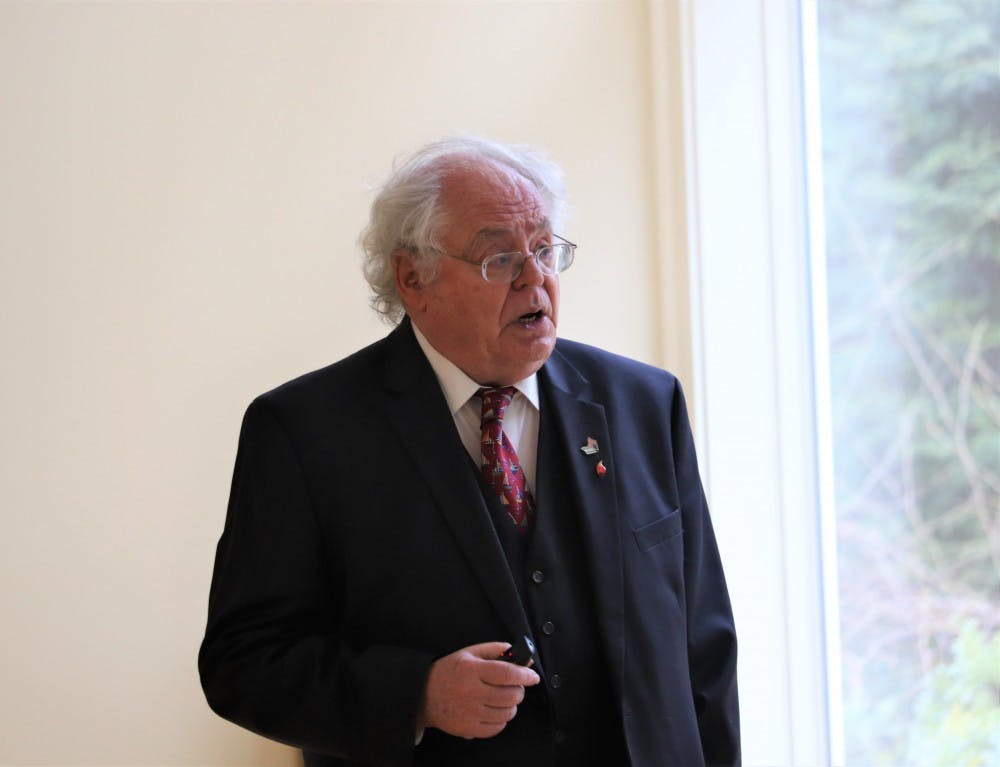Members of the Jewish community at the University gathered Sunday afternoon to hear the story of Holocaust survivor Dr. Roger Loria. Loria, emeritus professor of microbiology and immunology at Virginia Commonwealth University’s School of Medicine, spoke at the event sponsored by the Hillel Jewish Leadership Council in partnership with the Brody Jewish Center.
The Council presented Loria’s story in the form of Zicaron ba’salon, which, according to the event description, is an Israeli tradition where community members discuss stories of survivors and “sing, think, read, talk and most importantly — listen.”
Loria — born in Antwerp, Belgium in 1940 — was three-weeks-old when the Nazis invaded his hometown. As Belgium’s flatlands are amenable to military travel, the Nazis employed them as a route to the rest of Europe. Jews in these territories were subjugated and eventually deported to concentration camps across Europe.
After Loria and his mother fled from Belgium to France, they were caught and interned at various concentration camps under Nazi control.
“5,334 people went to France ‘Libre’. Only 317 survived,” Loria said. “My mother and I are two of the 317.”
After escaping from a concentration camp in Southern France, Loria and his mother traversed the country on foot to the Swiss border with the help of a smuggler in a group with three others. Loria was two-years-old at the time — the eldest of two children in their party — and was subsequently charged with the supervision of the younger child.
“There was another baby … I had to ensure that if he cried, I put a sugar cube in his mouth, so they wouldn’t hear him scream,” Loria said. “So the Germans wouldn’t pick us up.”
They remained in Switzerland until the end of the war, when they were repatriated as Belgian citizens. Loria and his mother eventually immigrated to Israel with a group of children from a Jewish orphanage in Belgium. He remained there, serving in the Israeli military, until he sought to pursue his education overseas.
In an interview with the Cavalier Daily, Virginia Interfaith Coalition executive Kendall Krantz commented on Loria’s presentation.
“It’s also interesting that he brought up other prejudices in America,” Krantz said. “That’s something I really love to talk about because our community is less often marginalized at face value since we pass as white.”
When questioned about the aftermath of anti-Semitic activity in Charlottesville — particularly the violence surrounding the white supremacist rallies of Aug. 11 and Aug. 12 in 2017 — Krantz expressed appreciation for the support the Jewish community received.
“There was a great community showing,” Krantz said. “We got a letter from the Sevens, we got letters from our neighbors … everyone was in that together and they were all supportive. And the next time anything happens — hopefully it never will — but the next time anything happens, we will be there to support them too.”
Loria also attempted to dismantle common misconceptions about the role of Jews in World War II.
“There is this fallacy that Jews were weak and didn’t defend themselves,” Loria said. “More than a quarter of a million Jewish soldiers enlisted in WWII … Whenever there was a possibility, they enlisted to fight and they fought whenever they could.”
In addition to narrating his life during and after the Holocaust, Loria drew ties between the events of WWII and the actions of world leaders today.
“[Hitler] was elected to a democratic system to be Chancellor,” Loria said. “Only a month later, he turned into a dictator. Keep that in mind, because it is relevant today too.”
Loria ended his presentation with a comment on the nature of hate crimes and discrimination in the United States.
“We are the canary in the mine, but we are not alone,” Loria said. “In this country, we have had discrimination against any group possible. Italians in New Orleans were lynched in 1891. Irish were not wanted here … Jews obviously not allowed. Black and Mexican, Chinese and Japanese, anyone can be the target — keep that in mind. It is not the color of the skin, it is not what you eat, what you wear — it is the hate, plain and simple.”







